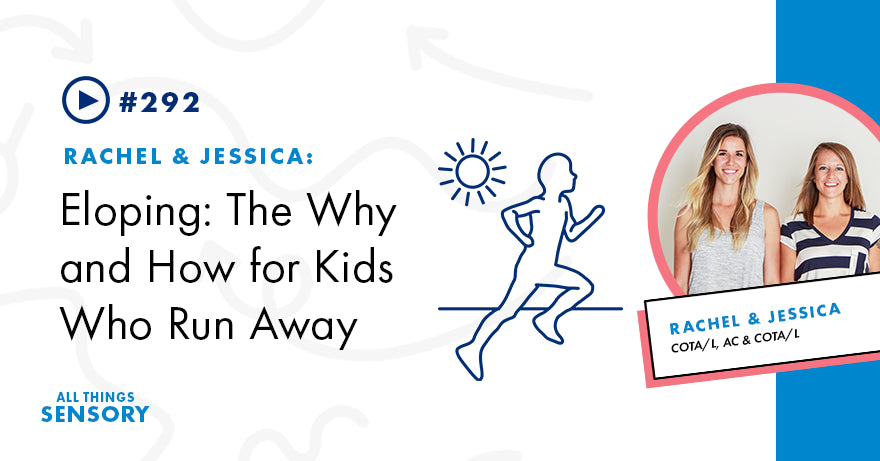Your Cart is Empty

What is eloping? When we’re in therapy talking about eloping, it’s when the child runs. They run away from the task, they run away from the situation, or even run out of the building. There can be a variety of reasons for elopement - we dive into these reasons PLUS specific strategies for each potential reason, including: sensory strategies to help calm the nervous system, building rapport and providing positive reinforcement, using visuals, and more!
Make sure to check out all of our links below!
We’d love to answer your questions on the podcast! Fill out this form -> https://harkla.typeform.com/to/ItWxQNP3
All Things Sensory Podcast Instagram
Harkla YouTube Channel
Harkla Website - Shop Sensory Products!
Harkla Instagram
Ep. 256 Fight-Flight-Freeze
Ep. 187 Meeting the Sensory Threshold
Ep. 4 Using Visual Schedules
Ep. 223 Strategies for Pre-Verbal Children
Ep. 74 Building Rapport
When a child elopes, they are attempting to evade a task or situation by swiftly departing from their immediate surroundings. Some children may flee out of fear of consequences, while others seek adventure or simply yearn to explore their environment.
However, it is important for parents not to always view elopement as disobedience or rebellion, as this can be worrisome. In fact, there are legitimate reasons why children may choose to elope, and it is crucial for adults to understand these motivations in order to effectively prevent and address this behavior.
Children may elope for a variety of reasons, including:
Before effectively addressing and resolving the issues that lead a child to run away, it is crucial to understand the underlying reasons behind their actions. To accomplish this, consider the following approaches:
In addition to preventive measures, it is also important to have strategies in place for dealing with elopement if and when it occurs:
Parents play a crucial role in nurturing their children and guiding them towards healthier ways to cope with stress and challenges. Additionally, educating teachers and caregivers about elopement and its prevention contributes to ensuring children's safety.
Remember, every child is unique and may require tailored strategies to manage elopement behavior effectively. It is important to remain patient and persistent in finding what works best for your child. Therefore, parents should take a proactive approach in addressing this behavior and seek appropriate resources or professional assistance if necessary.
BORING, BUT NECESSARY LEGAL DISCLAIMERS
While we make every effort to share correct information, we are still learning. We will double check all of our facts but realize that medicine is a constantly changing science and art. One doctor / therapist may have a different way of doing things from another. We are simply presenting our views and opinions on how to address common sensory challenges, health related difficulties and what we have found to be beneficial that will be as evidenced based as possible. By listening to this podcast, you agree not to use this podcast as medical advice to treat any medical condition in either yourself or your children. Consult your child’s pediatrician/ therapist for any medical issues that he or she may be having. This entire disclaimer also applies to any guests or contributors to the podcast. Under no circumstances shall Rachel Harrington, Harkla, Jessica Hill, or any guests or contributors to the podcast, as well as any employees, associates, or affiliates of Harkla, be responsible for damages arising from use of the podcast.
Keep in mind that we may receive commissions when you click our links and make purchases. However, this does not impact our reviews and comparisons. We try our best to keep things fair and balanced, in order to help you make the best choice for you.
This podcast should not be used in any legal capacity whatsoever, including but not limited to establishing “standard of care” in a legal sense or as a basis for expert witness testimony. No guarantee is given regarding the accuracy of any statements or opinions made on the podcast.
Comments will be approved before showing up.